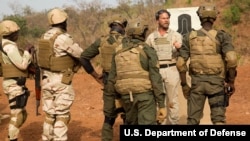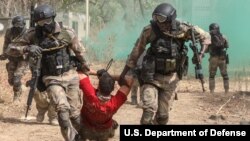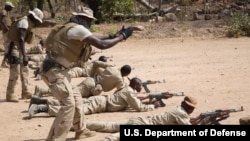Violence fueled by extremists is on the rise in the West African nation of Burkina Faso and appears to be getting worse.
In April more than 65 people died in ethnic clashes inflamed by Islamist extremists seeking to gain a stronghold in the Sahel. On Sunday, four worshippers and a pastor were killed when gunmen targeted a church in the small northern town of Silgadji, local security sources said.
“What we fight against, what we see every day is like a toxin,” Lt. Col. Kanou Coulibaly of the Burkina Faso Armed Forces told VOA.
Use the arrows below to navigate to Carla Babb's video reports from Burkina Faso.
Burkina Faso has seen more than 230 attacks in just over three years, and the United States is hoping local forces can increase pressure on the militants, even as the U.S. military decreases its force numbers in the region.
The attacks began shortly after the country elected its first new leader in decades, Roch Marc Christian Kabore, in 2015.
U.S. Ambassador to Burkina Faso Andrew Young tells VOA that the violence has quickly spread across a nation virtually untouched by terrorism just a few years ago.
“They're trying to target the resilience of this community, which has lived in harmony for thousands of years. There are Muslims and Christians who are in the same family, and those terrorist groups (are trying) to break down a stable society and attack a fragile democracy," Young said.
Now, just as instability provided terrorists an opening to infiltrate in Iraq and Syria, Islamist groups are planting their flags in West African nations like Burkina Faso.
"We know that al-Qaida considers the Sahel right here to be a very important area for them to deliberately and quietly build infrastructure. They've been doing this for a number of years, and they've been fairly successful," Air Force Maj. Gen. Marcus Hicks, the commander of U.S. Special Operations Command Africa, tells VOA.
Speaking on the sidelines of Flintlock, a major U.S.-led military exercise held in Burkina Faso involving more than 30 African and Western countries that ended in March, Hicks says, "At this time, we are not winning" the counterterrorism war in West Africa.
Officials worry that if the terrorists win in Burkina Faso, the country could become a launchpad for terrorists to expand their influence to West Africa's coast and beyond.
US, international training
That’s why training exercises with Sahel nation forces are critical, Hicks says. African militaries learn skills ranging from how to plan operations to how to treat and evacuate the wounded.
Burkinabe Gendarmes First Lt. Robert Compaore says the newly honed skills make a big difference on the battlefield.
In response to the uptick in violence, the U.S. embassy has tripled its funding to Burkina Faso for security assistance.
But instead of bringing in more troops, the U.S. is actually decreasing its numbers in West Africa. About 1,000 American troops will remain in the region, and Hicks says that’s still enough forces to help build local security partners.
However, he does not recommend further cuts and has warned the terrorism threat will be "a long-term problem."
The military is not the only security prong to receive U.S. and international training in Burkina Faso. The United States also funded training for law enforcement units who would likely serve as first responders to attacks in the capital, Ouagadougou.
“So we move from battlefield to custody, chain of custody, judicial process to accountability through the rule of law system. That's the key to success in the long term,” Ambassador Young says.
But the U.S. Embassy's Regional Security Officer Rosendo "Rosie" Cedeno says there is a major hitch in that system -- terrorism cases are not going to trial.
“So here in Burkina Faso, there are a lot of terrorism cases. And one of the challenges is that they haven't been able to prosecute a case just yet,” Cedeno said.
Sources familiar with Burkinabe terrorism cases tell VOA there are about 400 cases involving nearly 200 terror suspects imprisoned in Burkina Faso with no trial date.
The government of Burkina Faso has not replied to VOA requests for comment.
In response to the backlog, the U.S. embassy has sent a U.S. prosecutor from the Department of Justice to help build and try these cases.
Education targeted in attacks
The United Nations reports more than 100,000 people have been displaced this year in Burkina Faso because of violence. The threat from jihadist violence is now so severe in the country that it is preventing about 5,000 teachers and 150,000 children from going to school.
“Any Burkinabe must be concerned because to destroy a country, you just need to destroy education," education advocate Hawa Bissiri, of Burkina Faso's IQRA Association, told VOA.
For displaced teacher Sia Michael, "It’s a matter of life and death."
As he spoke to VOA at a local elementary school playground in the capital, he remembered the joy of his students before Islamic militants burned down his school and forced him to flee.
"What are you going to do? You have to leave. Once they burn down the school, then your life is next," he said.
The school closings have spread across the country’s east and north, where jihadists from neighboring Mali and Niger have spilled over the borders.
Opposed to Western education, the militants destroy some schools like Michael’s. Others are closed by teachers worried they’ll be targeted next.
Badina Joseph told VOA that Salafists showed up in December at his village near the country’s northern border with Mali and "warned teachers that if we did not move or start teaching in Arabic the following day, we better leave the village."
He said the requirement was impossible since they didn't speak the language, so teachers closed the schools and left before the holidays.
Officials are working to reopen some schools, but many fear children won’t attend as long as violence remains on the rise.
Mamadou Diop and Issa Napon contributed to this report.


